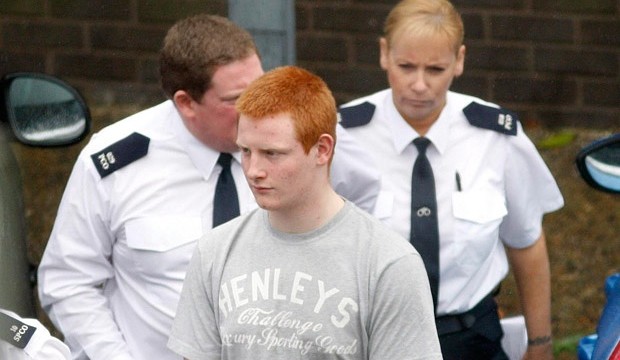
John Paul Wootton in custody of the Police Service of Northern Ireland (Paul Faith/Press Association)
By Julian Ichim
On August 8th, 2015 people across the world will be joining in actions demanding the release of the Craigavon Two, Irish Republican prisoners unjustly imprisoned for the murder of a RUC (Royal Ulster Constabulary in Northern Ireland) police officer. In Kitchener and Toronto local organizers are planning demonstrations and a public event around internment in the Occupied Six Counties.
Packy Carty of the Justice For The Craigavon Two Committee in Ireland stated that “the case of the Craigavon Two is a clear case of a miscarriage of justice and targeting of Irish Republicans. The case against the Craigavon Two centred around four strands of so-called evidence: the brown jacket DNA, the brown jacket residue, Witness M and a British Army MI5 tracking device.”
He continued, “When Brendan McConville and John Paul Wootton were taken for interrogation by the PSNI, they seized Wootton’s car, and in the car they found a brown jacket with a number of DNA profiles, one of which belonged to Brendan McConville; also on the jacket was a firearms type residue. It was proved beyond doubt that the residue did not come from an AK 47, which was the weapon used in the shooting. The amount of DNA on the brown jacket could have been innocently placed by a sneeze or a slight touch. Brendan McConville and John Paul Wootton were friends and Brendan had been in the car before. Yet the crown prosecution were trying to say that the coat belonged to McConville and was used in the shooting, even though the forensics disproved this theory.”
In terms of Witness M, a secret Witness giving testimony, Carty asserts that “his testimony was discredited in court, as he could not have seen the shooting of the police officer. He needed glasses, which he was not wearing that night, and there are other inconsistencies in his testimony.”
“After Wootton and McConville had become well-known in the newspapers and media, a man known only as witness M phoned the PSNI in the middle of the night while drunk and said he could identify those involved in the shooting. Despite being a questionable witness this man became the key part of the prosecution case. He said he had seen McConville near the scene of the shooting that night; it later transpired in court that his eyewitness testimony was clinically impossible, as he was severely short sighted and lied openly in court about his eyesight” stated Carty.
Carty also brought up the fact that Witness M’s own father, who is on the court record as “Witness Z”, came forward to call his son a liar in court.
On the issue of the tracking device, Carty points out that “it emerged that on the night of the shooting the British Army, most probably at the behest of MI5, were tracking Wootton’s car using a covert device. When the device was examined after Wootton’s car was seized, half of the data was purposely deleted, yet despite this destruction of evidence the device was accepted as evidence in the court.”
Despite all these inconsistencies and nothing linking Wootton or McConnville to the scene of the crime, they were both convicted and given life sentences. An appeal was carried out, yet the conviction was upheld despite the fact that according to Carty the prosecutor admitted that they cannot prove beyond a reasonable doubt that either McConville or Wootton was involved in the shooting or supporting the shooters with logistics, etc. in the aftermath. At that point in time, a Supreme Court hearing was scheduled to hear the case yet this was cancelled with no explanation.
Due to the lack of justice seen in Ireland surrounding this case, international organizers have concluded that justice can only be served by people across the world taking action. Here in Kitchener, organizer Terry Helm said, “The case of the Craigavon Two is not just about these two people but about the injustice of the British occupational forces in Ireland criminalizing people, not because of acts that they can prove but rather for their political convictions.”
He continued, “If this hearing was carried out in a regular court this decision would be different, but when you have special laws, secret evidence, no right to confront your accusers and the presumption of guilt before innocence, what do you expect?”
He finished by comparing the treatment of the Craigavon Two with possible treatment of Canadian activists in the future: “With Bill C-51 becoming law, this case has more serious implications here for those who are engaged in activism, as the legal system that condemned them will become law here.”
Comments